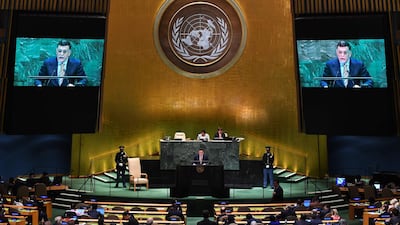The UN Security Council on Wednesday adopted a resolution calling for a lasting ceasefire in Libya, where a fragile truce has been in place since January.
The text, drafted by Britain, was approved by 14 votes out of 15, with Russia abstaining.
It was subject to weeks of wrangling, reflecting deep international divisions over Libya despite world leaders recently agreeing to end all foreign interference and uphold a weapons embargo.
"It is clear that there is no military solution in Libya. We condemn the violations of the commitments agreed upon during the Berlin conference," a joint statement released by Belgium, France, Germany, Estonia and Poland ahead of the vote said. "All member states should refrain from exacerbating the conflict and strictly comply with the UN arms embargo. The international community should seek to reinforce its monitoring under the auspices of the UN and provide more information to the UN panel of experts."
The resolution affirmed "the need for a lasting ceasefire in Libya at the earliest opportunity, without pre-conditions".
It also expressed "concern over the growing involvement of mercenaries in Libya".
Russia had pushed to replace the word "mercenaries" with "foreign terrorist fighters".
Since the beginning of the year, Turkey has sent thousands of Syrian militia fighters to Libya to bolster the Tripoli administration. The move has been criticised by several European and Arab states.
Libya, Africa's most oil-rich nation, has been mired in chaos since the 2011 Nato-backed uprising that toppled and killed longtime dictator Muammar Qaddafi.
Since April 2019, eastern military leader Field Marshal Khalifa Haftar has been trying to take Tripoli from the Government of National Accord and the militias it employs to defend it.
A ceasefire was agreed to on January 12, but there are still near-daily clashes near Tripoli and arms continue to flow into the country.
Witnesses reported fresh clashes on Thursday that forced flights to be suspended at Mitiga, Tripoli's sole functioning airport.


